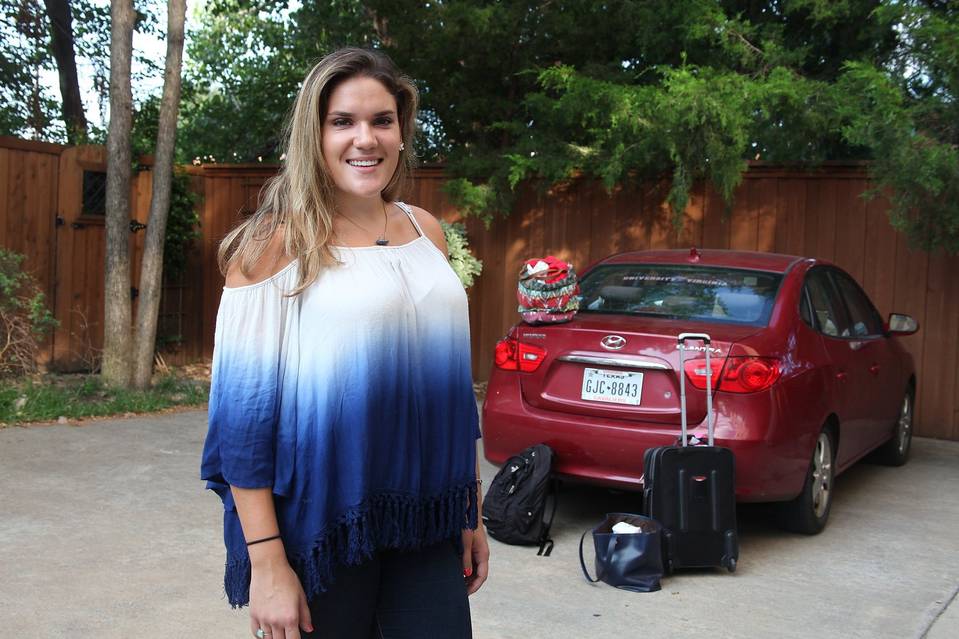
Learning another country’s business customs can take years of trial and error. Starting in September, 24-year-old Sierra Prochna will study the mores of corporate culture in Asia and Europe for the next year as a part of a new master’s program.
Ms. Prochna will embark on a journey with 60 other students of the University of Virginia’s business school that includes coursework on three different continents. She’ll spend 15 weeks learning global commerce on the university’s Charlottesville, Va., campus, then study at Lingnan University in Guangzhou, China, for nine weeks, before heading to Ramon Llull University’s ESADE Business and Law School in Barcelona for 15 weeks.
At the end of the one-year program, she and her classmates will earn a master’s in global commerce from UVA’s McIntire School of Commerce, and a master’s in global strategic management from ESADE. The program costs about $45,000.
Ms. Prochna, who until August was an account executive for a Texas-based social-media marketing company, said she believes the program will put her on a fast track to a role at an advertising or marketing firm where she can liaise among clients from various countries. Though such global roles often go to more seasoned employees, “I want to travel and work now, not when I have kids at home,” she said.
One-year master’s programs in business have grown in popularity in recent years, especially among students who want a quicker alternative to a two-year M.B.A. A new pair of yearlong programs at UVA and Georgetown University offer a fresh twist on the degrees, combining U.S.-based classroom instruction with studies abroad in Asia, Europe and South America.
The schools say the programs address growing student demand for specialized degrees and international careers. Though M.B.A.s still remain the most popular postgraduate business degree, a recent survey of 10,000 prospective students conducted by the Graduate Management Admission Council found that about 25% were considering one-year master’s degrees, up from 15% in 2009. Interest in pursuing a career abroad hovers around 35%, while more than half of those surveyed said they preferred to study abroad.
“There is a great demand and need for people in existing businesses to understand an international environment,” said Paul Almeida, a professor at Georgetown University’s McDonough School of Business, which will launch its international master’s program in January. The master’s in international business and policy is open to college graduates with at least five years’ work experience and will take place in Washington, D.C., Chile, and Germany in six installments of weeklong programs, with online courses in between. Tuition, housing and food for the one year totals around $75,000.
Mr. Almeida said people repeatedly asked “if we had something that combined international business and international relations.”
Other programs such as the CEMS-The Global Alliance in Management Education, founded in 1988, and Schwarzman Scholars offer master’s degrees in international business topics but don’t involve study on U.S. campuses.
Georgetown’s curriculum will combine online and in-person instruction. About 35 students will go to different locations to participate in case studies. The students will travel to Santiago, Chile, to investigate that country’s “decision to open up to investment and free trade,” according to the course description. A few weeks later, students head to Frankfurt to examine the impact of the U.K.’s decision to exit from the European Union on the European economy.
Students like Ms. Prochna, who worked with Chinese clients in her previous job, say global programs teach vital career lessons. Drake Pooley, 20 years old and a recent graduate of Auburn University, said his college business courses lacked emphasis on global business.
After completing a college study-abroad program in China and an internship at a state-owned real-estate company, Mr. Pooley said he knew he still had a lot more to learn. His young Chinese colleagues were immersed in American and international media; by contrast, his lack of exposure to other cultures during school made him feel like he lacked the know-how for international business.
When he joins Ms. Prochna in UVA’s master’s in global commerce program, he plans to learn about deal-making abroad. He said he is especially eager since Americans make up just 40% of the student body in the program and he will learn from Chinese professors at Lingnan University.
“Good ideas can come from anywhere,” said Mr. Pooley, who aspires to work in venture capital, scouting potential investments from Chinese cities. “A lot of the skills that I gain from this program will help me in trying to start out in that industry.”
[Source:-The Wall Street journal]



